Jean Reno (1948) is a Moroccan-born French actor of Spanish descent, with a low-key raspy voice. He became known for his many roles in films by director Luc Besson, including Le Grand Bleu/The Big Blue (1988), Nikita (1990), and Léon/Léon: The Professional (1994). Working in French, English, Japanese, Spanish, and Italian, he has appeared in numerous successful films such as Mission: Impossible (1996), Godzilla (1998), Ronin (1998) and Crimson Rivers (2000).

French postcard by Sonis, no. C 848. Photo: Gaumont, 1998. Jean Reno and Jean-Marc Barr in Le Grand Bleu (Luc Besson, 1988).
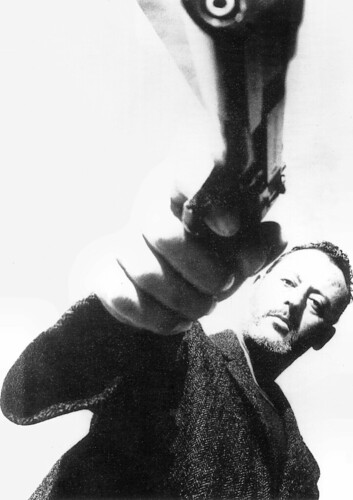
French postcard, no. PP 122. Photo: publicity still for Léon/Léon: The Professional (Luc Besson, 1994).

French postcard by BVI. Christian Clavier and Jean Reno in Les couloirs du temps - Les visiteurs II / The Corridors of Time: The Visitors II (Jean-Marie Poiré, 1998).
Jean Reno was born Juan Moreno y Herrera-Jiménez in Casablanca, Morocco, in 1948. His Spanish parents had moved to North Africa to find work and escape the dictatorship of Francisco Franco. He has a younger sister named María Teresa ‘Maite’. Their father was a linotypist. Their mother died when Juan was a teenager. He learned Spanish from his parents, and Arabic and French growing up in Morocco.
At the age of seventeen, Juan Moreno moved to France, where he studied acting at the Cours Simon School of Drama. When Moreno moved to France, he served in the French army, which was mandatory to gain his French citizenship. After he started to get acting jobs in France, Juan adopted the French version, Jean, of his name and shortened his surname to Reno. He had a role in every play of stage director Didier Flamand from 1977 to 1981, and then had the lead role in Flamand's first short film La vis / The Notice (Didier Flamand, 1993). He made his film debut in the mystery film L'Hypothèse du tableau vole / The Hypothesis of the Stolen Painting (Raúl Ruiz, 1979). That same year, he played a bit role as a policeman in Clair de femme / Womanlight (Costa-Gavras, 1979) with Romy Schneider.
Due to his large frame (1.88 m or 6 ft 2 in), Reno was called on to play ‘heavies’ in his early career. He had his first prominent role in the post-apocalyptic Fantasy film Le dernier combat / The Last Battle (Luc Besson, 1985). It was the first feature film to be directed by Luc Besson. Wikipedia: “A dark vision of post-apocalyptic survival, the film was shot in black and white and contains only two words of dialogue. It depicts a world where people have been rendered mute by some unknown incident.”
In 1981, Besson and Reno had worked on the short film L'Avant Dernier / Before The Last. Reno and Besson became close personal friends, and Reno collaborated in films produced, written or directed by Besson, who became known as one of the masters of the ‘Cinéma du look style’ (French film directors who were said to favour style over substance, spectacle over narrative). Reno played a supporting part in Besson’s breakthrough film, Subway (Luc Besson, 1985), starring Isabelle Adjani and Christophe Lambert.
Reno's own breakthrough came with their next film, Le Grand Bleu / The Big Blue (Luc Besson, 1988). Cast as the comic rival of diver Jacques Mayhol (Jean-Marc Barr), Reno received international exposure when The Big Blue became a worldwide hit with both critics and audiences. Reno was nominated for a Best Supporting Actor César. Of their joint work, those films that have achieved the most critical and commercial success are Nikita (Luc Besson, 1990) with Anne Parillaud, and Léon / Léon: The Professional (Luc Besson, 1994) with Gary Oldman and the young Natalie Portman. For his role as the calm assassin Léon, who reluctantly takes in a 12-year-old girl, Mathilda (Natalie Portman), Reno was nominated for the César in 1995. The film was a commercial success, grossing over $45 million worldwide on a $16 million budget.
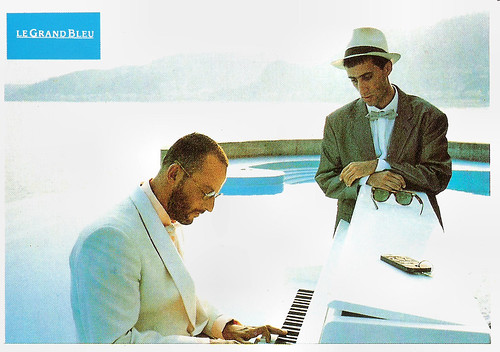
French postcard by Ciné Passion, no. GB 1. Photo: publicity still for Le Grand Bleu (Luc Besson, 1988) with Sergio Castellitto.

French postcard by Ciné Passion, no. GB 4. Photo: publicity still for Le Grand Bleu (Luc Besson, 1988).
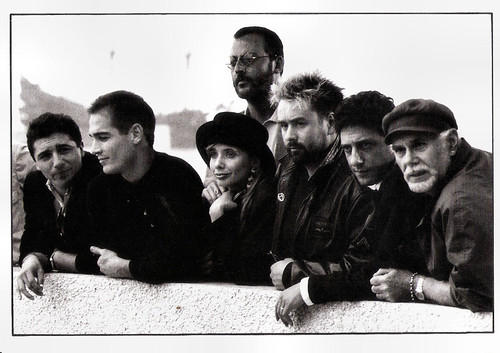
French postcard by News Productions, Beaulmes, no 56063. Photo: Eric Coiffier. Director and cast of Le Grand Bleu (Luc Besson, 1988) at the Festival de Cannes, 1988. In the front row from left to right: Marc Duret, Jean-Marc Barr, Rosanna Arquette, Luc Besson, Sergio Castellitto and Andréas Voutsinas.
From the 1990s on, Jean Reno appeared in international romantic comedies and action films. He starred in several French box office hits. He played a 12th-century knight and Christian Clavier his servant in the fantasy comedy Les Visiteurs / The Visitors (Jean-Marie Poiré, 1993), the Number 1 box office film in France in 1993. Reno and Clavier reprised their roles in a sequel, and the American remake Just Visiting (Jean-Marie Gaubert, 2001) with Christina Applegate.
Other French smashes were the psychological horror film Les Rivières Pourpres / The Crimson Rivers (Mathieu Kassovitz, 2000) with Vincent Kassel, and the comedy Décalage horaire / Jet Lag (Danièle Thompson, 2002) with Juliette Binoche.
Reno did the voice-over for Mufasa in the French-language version of the animated film The Lion King (Roger Allers, Rob Minkoff, 1994). He also played in such high-profile American films as the romantic comedy French Kiss (Lawrence Kasdan, 1995) with Meg Ryan and Kevin Kline, Mission: Impossible (Brian De Palma, 1996) with Tom Cruise, and Ronin (John Frankenheimer, 1998) with Robert De Niro.
To do the disastrous wannabe summer blockbuster Godzilla (Roland Emmerich, 1998), Reno turned down the role of Agent Smith in The Matrix (The Wachowski Brothers, 1999). The part would be played by Hugo Weaving.
In 2006, Reno had a prominent role in the remake of The Pink Panther (Shawn Levy, 2006) and its sequel, playing Gilbert Ponton, opposite Steve Martin as Inspector Clouseau. He portrayed Captain Bezu Fache in the film adaptation The Da Vinci Code (Ron Howard, 2006), starring Tom Hanks and Audrey Tautou.
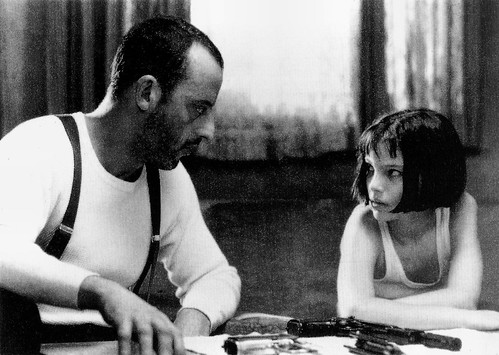
French postcard, no. PP 104. Photo: publicity still for Léon / Léon: The Professional (Luc Besson, 1994) with Natalie Portman.
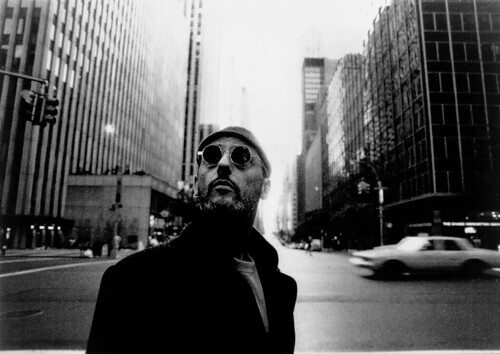
French postcard, no. PP 108. Photo: publicity still for Léon / Léon: The Professional (Luc Besson, 1994).
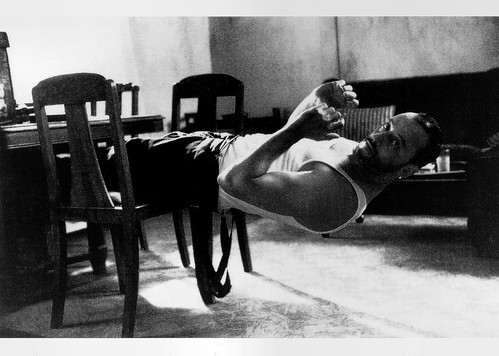
French postcard, no. PP 125. Photo: publicity still for Léon / Léon: The Professional (Luc Besson, 1994).
In other media, Jean Reno was involved in the production of the third instalment in the popular Capcom game series Onimusha, Onimusha 3: Demon Siege (Minoru Nakai, 1994). For this action-adventure game, he lent his likeness to the protagonist Jacques Blanc, as well as provided the voice for the character's French dialogue.
In advertising work, Reno has appeared in American television commercials for UPS and portrayed Doraemon in a series of Toyota ads in Japan, as part of the ReBorn campaign. His films included La Rafle / Razzia (Rose Bosch, 2010), the comedy Hector and the Search for Happiness (Peter Chelsom, 2014), and the family film Brothers of the Wind (Gerardo Olivares, Otmar Penker, 2015).
Jean Reno has been married three times. His first wife was Geneviève Reno, with whom he has a daughter, Sandra (1978), and a son, Mickael (1980). They divorced in 1995. Reno's second wife was Nathalie Dyszkiewicz, a Polish model, with whom he has a son, Tom (1996), and a daughter, Serena (1998). They divorced in 2001. In 2006, Reno married for the third time, to another Polish model and actress, Zofia Borucka. Then-presidential candidate Nicolas Sarkozy and singer Johnny Hallyday served as his best men (Reno endorsed Sarkozy for the 2007 French presidential election). Zofia and Reno have two sons, Cielo (2009) and Dean (2011). Reno maintains homes in Paris, Malaysia, and Los Angeles.
Later films with Reno are the American drama The Last Face (Sean Penn, 2016) with Charlize Theron and Javier Bardem, the historical drama The Promise (Terry George, 2016) starring Christian Bale, and Da 5 Bloods (2020), an American war drama film directed, produced, and co-written by Spike Lee. In 2025, he can be seen in the thriller Tuner (Daniel Roher, 2025) starring Leo Woodall and Dustin Hoffman, and can be heard as a goat police officer in Zootopia 2 (Jared Bush, Byron Howard, 2025), an upcoming American animated buddy cop comedy produced by Walt Disney Animation Studios.
Jason Buchanan described Reno’s appeal at AllMovie: “With mournful eyes that suggest deep contemplation lurking beneath a sometimes imposing exterior, French actor Jean Reno (born July 30th, 1948) has carved a particular niche in cinema by portraying men who prefer to define themselves through action rather than words. Though his characters may often resort to violence without pause when necessary, that isn't to say that they are without the sort of honour or dignity that has served to define some of the screen's most memorable action stars.”

French postcard by Ciné Passion, no. GB 5. Photo: Marc Duret and Jean Reno (right) in Le Grand Bleu (Luc Besson, 1988).
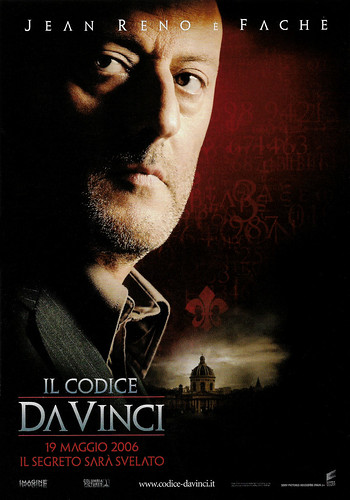
Italian promocard by The Cult Advertising, no. PC 6388. Image: Imagine / Columbia Pictures / Sony Pictures. Jean Reno in The Da Vinci Code (Ron Howard, 2006). Caption: Jean Reno is Fache. 19 May 2006, the secret will be revealed.
Trailer Ronin (1998). Source: Movieclips Trailer Vault (YouTube).
American trailer for Le Chef (2014). Source: Movieclips Film Festivals & Indie Films (YouTube).
Sources: Jason Buchanan (AllMovie - Page now defunct), Wikipedia, and IMDb. Thanks to Marlene Pilaete for her correction in the text.

French postcard by Sonis, no. C 848. Photo: Gaumont, 1998. Jean Reno and Jean-Marc Barr in Le Grand Bleu (Luc Besson, 1988).

French postcard, no. PP 122. Photo: publicity still for Léon/Léon: The Professional (Luc Besson, 1994).

French postcard by BVI. Christian Clavier and Jean Reno in Les couloirs du temps - Les visiteurs II / The Corridors of Time: The Visitors II (Jean-Marie Poiré, 1998).
Calm assassin
Jean Reno was born Juan Moreno y Herrera-Jiménez in Casablanca, Morocco, in 1948. His Spanish parents had moved to North Africa to find work and escape the dictatorship of Francisco Franco. He has a younger sister named María Teresa ‘Maite’. Their father was a linotypist. Their mother died when Juan was a teenager. He learned Spanish from his parents, and Arabic and French growing up in Morocco.
At the age of seventeen, Juan Moreno moved to France, where he studied acting at the Cours Simon School of Drama. When Moreno moved to France, he served in the French army, which was mandatory to gain his French citizenship. After he started to get acting jobs in France, Juan adopted the French version, Jean, of his name and shortened his surname to Reno. He had a role in every play of stage director Didier Flamand from 1977 to 1981, and then had the lead role in Flamand's first short film La vis / The Notice (Didier Flamand, 1993). He made his film debut in the mystery film L'Hypothèse du tableau vole / The Hypothesis of the Stolen Painting (Raúl Ruiz, 1979). That same year, he played a bit role as a policeman in Clair de femme / Womanlight (Costa-Gavras, 1979) with Romy Schneider.
Due to his large frame (1.88 m or 6 ft 2 in), Reno was called on to play ‘heavies’ in his early career. He had his first prominent role in the post-apocalyptic Fantasy film Le dernier combat / The Last Battle (Luc Besson, 1985). It was the first feature film to be directed by Luc Besson. Wikipedia: “A dark vision of post-apocalyptic survival, the film was shot in black and white and contains only two words of dialogue. It depicts a world where people have been rendered mute by some unknown incident.”
In 1981, Besson and Reno had worked on the short film L'Avant Dernier / Before The Last. Reno and Besson became close personal friends, and Reno collaborated in films produced, written or directed by Besson, who became known as one of the masters of the ‘Cinéma du look style’ (French film directors who were said to favour style over substance, spectacle over narrative). Reno played a supporting part in Besson’s breakthrough film, Subway (Luc Besson, 1985), starring Isabelle Adjani and Christophe Lambert.
Reno's own breakthrough came with their next film, Le Grand Bleu / The Big Blue (Luc Besson, 1988). Cast as the comic rival of diver Jacques Mayhol (Jean-Marc Barr), Reno received international exposure when The Big Blue became a worldwide hit with both critics and audiences. Reno was nominated for a Best Supporting Actor César. Of their joint work, those films that have achieved the most critical and commercial success are Nikita (Luc Besson, 1990) with Anne Parillaud, and Léon / Léon: The Professional (Luc Besson, 1994) with Gary Oldman and the young Natalie Portman. For his role as the calm assassin Léon, who reluctantly takes in a 12-year-old girl, Mathilda (Natalie Portman), Reno was nominated for the César in 1995. The film was a commercial success, grossing over $45 million worldwide on a $16 million budget.

French postcard by Ciné Passion, no. GB 1. Photo: publicity still for Le Grand Bleu (Luc Besson, 1988) with Sergio Castellitto.

French postcard by Ciné Passion, no. GB 4. Photo: publicity still for Le Grand Bleu (Luc Besson, 1988).

French postcard by News Productions, Beaulmes, no 56063. Photo: Eric Coiffier. Director and cast of Le Grand Bleu (Luc Besson, 1988) at the Festival de Cannes, 1988. In the front row from left to right: Marc Duret, Jean-Marc Barr, Rosanna Arquette, Luc Besson, Sergio Castellitto and Andréas Voutsinas.
Disastrous wannabe summer blockbuster
From the 1990s on, Jean Reno appeared in international romantic comedies and action films. He starred in several French box office hits. He played a 12th-century knight and Christian Clavier his servant in the fantasy comedy Les Visiteurs / The Visitors (Jean-Marie Poiré, 1993), the Number 1 box office film in France in 1993. Reno and Clavier reprised their roles in a sequel, and the American remake Just Visiting (Jean-Marie Gaubert, 2001) with Christina Applegate.
Other French smashes were the psychological horror film Les Rivières Pourpres / The Crimson Rivers (Mathieu Kassovitz, 2000) with Vincent Kassel, and the comedy Décalage horaire / Jet Lag (Danièle Thompson, 2002) with Juliette Binoche.
Reno did the voice-over for Mufasa in the French-language version of the animated film The Lion King (Roger Allers, Rob Minkoff, 1994). He also played in such high-profile American films as the romantic comedy French Kiss (Lawrence Kasdan, 1995) with Meg Ryan and Kevin Kline, Mission: Impossible (Brian De Palma, 1996) with Tom Cruise, and Ronin (John Frankenheimer, 1998) with Robert De Niro.
To do the disastrous wannabe summer blockbuster Godzilla (Roland Emmerich, 1998), Reno turned down the role of Agent Smith in The Matrix (The Wachowski Brothers, 1999). The part would be played by Hugo Weaving.
In 2006, Reno had a prominent role in the remake of The Pink Panther (Shawn Levy, 2006) and its sequel, playing Gilbert Ponton, opposite Steve Martin as Inspector Clouseau. He portrayed Captain Bezu Fache in the film adaptation The Da Vinci Code (Ron Howard, 2006), starring Tom Hanks and Audrey Tautou.

French postcard, no. PP 104. Photo: publicity still for Léon / Léon: The Professional (Luc Besson, 1994) with Natalie Portman.

French postcard, no. PP 108. Photo: publicity still for Léon / Léon: The Professional (Luc Besson, 1994).

French postcard, no. PP 125. Photo: publicity still for Léon / Léon: The Professional (Luc Besson, 1994).
Mournful eyes
In other media, Jean Reno was involved in the production of the third instalment in the popular Capcom game series Onimusha, Onimusha 3: Demon Siege (Minoru Nakai, 1994). For this action-adventure game, he lent his likeness to the protagonist Jacques Blanc, as well as provided the voice for the character's French dialogue.
In advertising work, Reno has appeared in American television commercials for UPS and portrayed Doraemon in a series of Toyota ads in Japan, as part of the ReBorn campaign. His films included La Rafle / Razzia (Rose Bosch, 2010), the comedy Hector and the Search for Happiness (Peter Chelsom, 2014), and the family film Brothers of the Wind (Gerardo Olivares, Otmar Penker, 2015).
Jean Reno has been married three times. His first wife was Geneviève Reno, with whom he has a daughter, Sandra (1978), and a son, Mickael (1980). They divorced in 1995. Reno's second wife was Nathalie Dyszkiewicz, a Polish model, with whom he has a son, Tom (1996), and a daughter, Serena (1998). They divorced in 2001. In 2006, Reno married for the third time, to another Polish model and actress, Zofia Borucka. Then-presidential candidate Nicolas Sarkozy and singer Johnny Hallyday served as his best men (Reno endorsed Sarkozy for the 2007 French presidential election). Zofia and Reno have two sons, Cielo (2009) and Dean (2011). Reno maintains homes in Paris, Malaysia, and Los Angeles.
Later films with Reno are the American drama The Last Face (Sean Penn, 2016) with Charlize Theron and Javier Bardem, the historical drama The Promise (Terry George, 2016) starring Christian Bale, and Da 5 Bloods (2020), an American war drama film directed, produced, and co-written by Spike Lee. In 2025, he can be seen in the thriller Tuner (Daniel Roher, 2025) starring Leo Woodall and Dustin Hoffman, and can be heard as a goat police officer in Zootopia 2 (Jared Bush, Byron Howard, 2025), an upcoming American animated buddy cop comedy produced by Walt Disney Animation Studios.
Jason Buchanan described Reno’s appeal at AllMovie: “With mournful eyes that suggest deep contemplation lurking beneath a sometimes imposing exterior, French actor Jean Reno (born July 30th, 1948) has carved a particular niche in cinema by portraying men who prefer to define themselves through action rather than words. Though his characters may often resort to violence without pause when necessary, that isn't to say that they are without the sort of honour or dignity that has served to define some of the screen's most memorable action stars.”

French postcard by Ciné Passion, no. GB 5. Photo: Marc Duret and Jean Reno (right) in Le Grand Bleu (Luc Besson, 1988).

Italian promocard by The Cult Advertising, no. PC 6388. Image: Imagine / Columbia Pictures / Sony Pictures. Jean Reno in The Da Vinci Code (Ron Howard, 2006). Caption: Jean Reno is Fache. 19 May 2006, the secret will be revealed.
Trailer Ronin (1998). Source: Movieclips Trailer Vault (YouTube).
American trailer for Le Chef (2014). Source: Movieclips Film Festivals & Indie Films (YouTube).
Sources: Jason Buchanan (AllMovie - Page now defunct), Wikipedia, and IMDb. Thanks to Marlene Pilaete for her correction in the text.
No comments:
Post a Comment